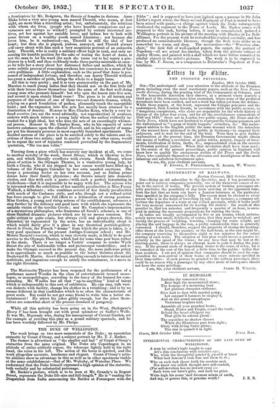DESIDERATU3I OF RAILWAYS.
Burton Crescent, 28th October 1852.
SIR—Being an old subscriber to the Spectator, may I beg permission to point out to railway companies generally, one of the numerous causes of de- lay in the arrival of trains. The present system of booking passengers ut- terly precludes the possibility of any train arriving at the appointed time, from the fact that no train can leave a London terminus at the particular time specified in the company's bills. The reason must be obvious to every person who is in the habit of travelling by rail. For instance, a company ad- vertises the departure of a train at one o'clock precisely, while it books until the very moment announced for its leaving the station : the result of this practice is, that ten minutes, and frequently a quarter of an hour, is occu- pied in making the necessary preparations for starting the train. As ladies are usually accompanied by five or six trunks, which unfortu- nately never run small, it follows, of course, that they must tie weighed ; and during the process of weighing, trucking, charging for extra weight, and placing the said luggage in the van, a pretty considerable time is generally consumed. I should, therefore, suggest the propriety of closing the booking- office doors at the hour, the quarter, or the half-hour, as the case might be ; the company reserving to themselves eight or ten minutes for the actual starting of each train. The adoption of this plan would insure a greater re- gularity in the speed of the trains; for any time that may be lost at the starting-point, there is always an attempt made to gain it during the jour- ney. If the present mode of despatching trains is the cause of delay, let it be remedied at the cost of the loss of a little time to the public : better that than accident. I um not of opinion that companies should be sued for com- pensation for non-arrival of their trains at the exact minute specified in their time-tables: if such powers be granted to the railway passenger, there could be no reason why a passenger by any other mode of conveyance should not have the same privilege.


























 Previous page
Previous page